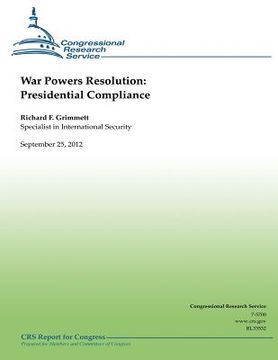Reseña del libro "War Powers Resolution: Presidential Compliance (en Inglés)"
Two separate but closely related issues confront Congress each time the President introduces Armed Forces into a situation abroad that conceivably could lead to their involvement in hostilities. One issue concerns the division of war powers between the President and Congress, whether the use of Armed Forces falls within the purview of the congressional power to declare war and the War Powers Resolution (WPR). The other issue is whether or not Congress concurs in the wisdom of the action. This report does not deal with the substantive merits of using Armed Forces in specific cases, but rather with congressional authorization for military action, and the application and effectiveness of the WPR. The purpose of the WPR (P.L. 93-148, passed over President Nixon's veto on November 7, 1973) is to ensure that Congress and the President share in making decisions that may get the United States involved in hostilities. Compliance becomes an issue whenever the President introduces U.S. forces abroad in situations that might be construed as hostilities or imminent hostilities. Criteria for compliance include prior consultation with Congress, fulfillment of the reporting requirements, and congressional authorization. If the President has not complied fully, the issue becomes what action Congress should take to bring about compliance or to influence U.S. policy. A related issue has been congressional authorization of U.N. peacekeeping or other U.N.-sponsored actions. For over three decades, war powers and the War Powers Resolution have been an issue in U.S. military actions in Asia, the Middle East, Africa, Central America, and Europe. Presidents have submitted 136 reports to Congress as a result of the War Powers Resolution, although only one (the Mayaguez situation) cited Section 4(a)(1) or specifically stated that forces had been introduced into hostilities or imminent hostilities. Congress invoked the WPR in the Multinational Force in Lebanon Resolution (P.L. 98-119), which authorized the Marines to remain in Lebanon for 18 months. In addition, P.L. 102-1, enacted in January 1991, authorizing the use of U.S. Armed Forces in response to Iraqi aggression against Kuwait, stated that it constituted specific statutory authorization within the meaning of the WPR. On November 9, 1993, the House used a section of the WPR to state that U.S. forces should be withdrawn from Somalia by March 31, 1994; Congress had already taken this action in appropriations legislation. War powers have been at issue in former Yugoslavia/Bosnia/Kosovo, Iraq, and Haiti. Authorizing military actions in response to the terrorist attacks against the United States of September 11, 2001, through P.L. 107-40 directly involved war powers. The continued use of force to obtain Iraqi compliance with U.N. resolutions remained a war powers issue from the end of the Gulf War on February 28, 1991, until the enactment of P.L. 107-243 in October 2002, which explicitly authorized the President to use force against Iraq, an authority he exercised in March 2003, and continues to exercise for military operations in Iraq. Most recently, issues associated with presidential compliance with the War Powers Resolution have arisen over his use of U.S. military forces to support a U.N. sanctioned "no-fly zone" in Libya, without obtaining congressional authorization for such action. Debate continues on whether using the War Powers Resolution is effective as a means of assuring congressional participation in decisions that might get the United States involved in a significant military conflict. Proposals have been made to modify or repeal the resolution. None have been enacted to date.

